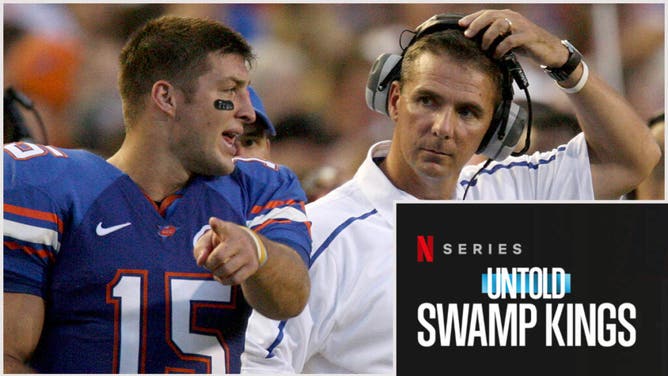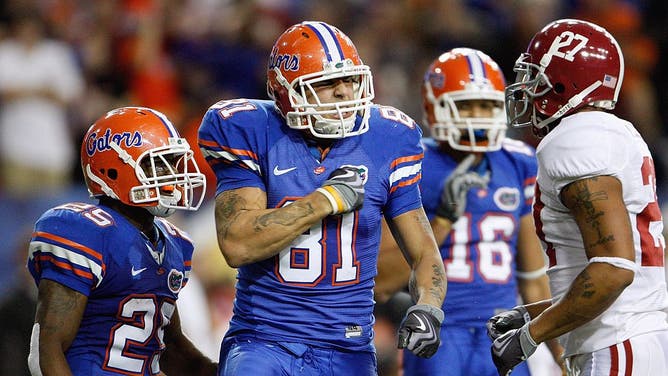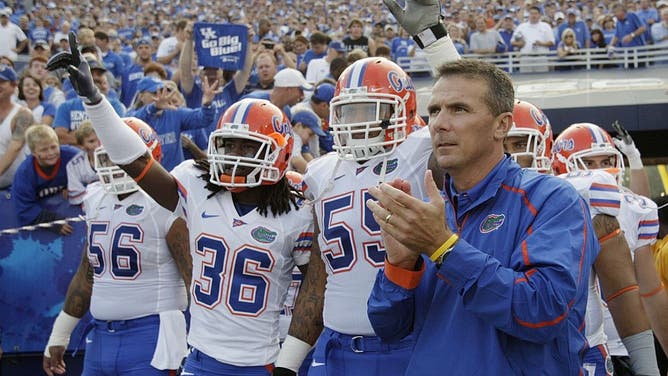'Swamp Kings' Could Have Been A Great Documentary, But Doesn't Deliver As Florida Did On Field | Trey Wallace
One of the most anticipated documentary’s surrouding a college football team was finally released on Tuesday, as 'Swamp Kings' debuted on Netflix. A story about the Florida Gators' rise back to the top under head coach Urban Meyer has people anxiously awaiting for the four-part series to drop.
Unfortunately, what had the appeal of a stunning behind-the-scenes look at the culture in Gainesville under Meyer quickly turned into a promotional video for the Florida football program. The stories are folktales now, from Tim Tebow's comments after the Ole Miss loss to the off-field issues that ended up becoming an unfortunate look in the mirror for those running the program.
Two national titles later and Urban Meyer resigning after just five seasons in Gainesville, this Florida team was the most talked about program of the mid-2000s.
Note: There are certain spoilers in this piece, so you can stop here if you like. But this piece includes an interview with the director, Katharine English.

Tim Tebow and Urban Meyer are prominently featured in a new documentary series on Netflix. (Getty Images/Netflix)
Even getting to this point where there is a documentary to watch about the Florida Gators is a story in itself. When Urban Meyer accepted the job in Gainesville after coaching at Utah, many folks wondered how he would handle the spotlight. At the time, his type of offense was an outlier to many around the country, with the help of offensive coordinator Dan Mullen.
Nevertheless, his job was to build the Florida football program back into the powerhouse that it once was under Steve Spurrier and leave no stone unturned while finding the right players to pull it off. As explained in the film, Urban was looking for the missing piece at quarterback— which he found just up the road in Jacksonville.
That quarterback, of course, was Tim Tebow. The rest is history.
'Swamp Kings' is centered around both the good and the bad, and according to director Katharine English, most of the players that participated in the documentary were hesitant at first.
“The players were quite cautious for sure, they didn’t just jump into it at all," she said. "We had to describe what our approach was. I’m not somebody immersed in the world of American football, I didn’t know whether that would help or hinder our effort."
Finding 'Lost Tapes' Saved The Documentary
One of the wildest parts of the documentary wasn't actually told over the four episodes, but came from director Katharine English. Speaking with OutKick, English said the behind the scenes footage that you see in a majority of the film came from 650 different tapes that were found during the shooting, which completely changed the dynamic of the film.
"There's this group of tapes. Do you know about the tapes? There's a box somewhere, it's under someone's desk. We don't really know where it is," English says. "And you're entirely right, it was shot by a couple of videographers that were part of the athletic team. And it covered exactly 2005 through 2010. And when we finally located these tapes, there were 650 of them. It was an absolute game changer. Because everything that we've ever spoken to the players about was in those tapes."
It's safe to assume that if these tapes were never found, this film wouldn't be drawing the attention it is through promotional trailers. From 'Mat Drills' that saw players wrestling with each other until they puked in the student gym on campus, to the 'Valentines Day Massacre' which was essentially a torture session for players and the most grueling workout of the year.
The footage was fascinating to see, especially after hearing about some of the events featured in the film. This certainly makes the documentary worth watching, with players discussing the crazy workouts and locker room scenes. The 'lost tapes' alone keep you on the edge of your seat while watching, with a few of the interviewed players shocked they were actually found.
These tapes were then licensed to Netflix by the University of Florida, who did not have editorial control, according to English.
"They had no editorial control of what we used, we've licensed it. But Netflix has editorial control," English said. "So the university ... are cautious. ... They haven't seen the series yet. They're cautious about what angle it's going to take or what narrative it's going to present."
'Untold' Parts Were Never Really Expounded Upon
While watching through the film three different times, I kept feeling like something was missing.
Ever since Urban Meyer resigned at Florida in 2010, stories of how players acted off the field have become a narrative surrounding the national championship-winning program. Frequent criminal activity took the attention from the on-field product.
I kept wondering if the story of Urban Meyer's tenure in Gainesville was going to bring forth a spotlight to the off-field problems. It never did.
The story of those Florida teams on the field were full of grit and profound brotherhood, which was portrayed most of the time in the film, thanks in large part to Tebow and Brandon Spikes. The off-field incidents seemed to be overlooked by the director at times during this film, which she discussed with OutKick.
There is one incident that potentially changed the culture at Florida that could be tied directly to Urban's philosophy on discipling players.The story Urban Meyer tells of dismissing defensive back Avery Atkins, who was accused of domestic violence, and the player’s life spiraling into being dismissed from another team, arrested for drug possession, and, ultimately, dying of a drug overdose sheds light on why Meyer says he wouldn’t give up on players anymore.
When I asked the director whether or not she felt her film shed enough light on the off-field problems, English alluded to the idea that the issues had been highlighted during other documentaries (Aaron Hernandez) in the past.
"Do you not think that previous to our series, those off fields, crimes and misdemeanors, if you want to call them that have been overly focused on," she retorted. "It would seem to me that team was characterized by press about crimes, and we looked into them with detail, we spoke to everyone, we pulled court records, we tried to speak to lawyers. We really, really looked into the veracity of all of the allegations."

Aaron Hernandez #81 of the Florida Gators reacts against the Alabama Crimson Tide during the SEC Championship on December 6, 2008 at the Georgia Dome in Atlanta, Georgia. (Photo by Kevin C. Cox/Getty Images)
One of the most surprising aspects of the series was that there was only one story that involved Aaron Hernandez, who went on to be convicted of murder while playing in the NFL. It is centered around the time that Hernandez beat a man outside a bar in Gainesville, which Tim Tebow took the blame for in the film. The hype for this whole documentary was built around the trials and tribulations of the Florida Gators during this time period, but it seemed to leave out one of the biggest stories.
The off-field issues for Hernandez included a 2007 investigation into a shooting where police questioned Hernandez about his involvement, along with a number of fights. The Gainesville police and the football program had their own issues, with a reported 31 players being arrested during Meyer's tenure at Florida.
I asked English about the decision to stay away from the topic of Hernandez and some of the 'Untold' stories about his time in Gainesville.
"I mean, a lot of the story you're referring to did happen after he left Florida," she said. "So it's completely out of our time frame, you know, we resolutely stuck to 2005 to 2010. And we wouldn't have dealt with anything outside of that moment. The players themselves didn't want an overemphasis on air. And they made that very clear from the beginning."
Part of her decision to tread lightly around Hernandez stemmed from the feelings of the subjects she interviewed.
" are very, you know, moved by what happened to him, and we respected that," English explained further. "I think, you know, he was a very well-loved player within the team. He was very young when he arrived at Florida. He was an amazing player. And I just really hope that we've managed to convey just another side to him in it somehow. I don't know if we have but, you know, treading that line is really hard."
The Documentary Should Have Tim Tebow's Name In The Title
Getting Tim Tebow to agree to participate in this documentary was key because most of the stories surrounding those Florida teams were made up of his moments on the field. It's easy to notice at times, with players discussing it, that the attention Tebow received during that run caused some friction within the locker room.
But this film would've fallen further if No. 15 wasn't involved, along with Meyer.
Seventeen years later, that spotlight hasn't dimmed, if anything it's only gotten brighter. Don't get me wrong, Tim Tebow has always been a standup guy who champions for the right things in life. His work with charities and his foundation are second to none, along with his motivational speaking.
But still, the story to this day is centered around Tim Tebow, which is clear by the statue that sits in-front of Ben Hill Griffin stadium and the attention the documentary puts on the quarterback.

Former Florida Gators head coach Urban Meyer did not want to appear in 'Swamp Kings' at first, then reconsidered.(Photo by Andy Lyons/Getty Images)
The story of winning two national titles, the countless moments on and off the field, along with his dedication to the game is crucial in telling the story of these teams. But, there were times where this felt as if I was watching a documentary about only Meyer and Tebow, which would've been great on its own. However, it was not advertised as such,
Getting Tebow and Meyer to participate was an initial challenge.
"To be honest, Urban and Tim both signed on before I joined the project, although access with them wasn't a done deal," English said. "I mean, they were definitely sort of signed up. But it was still, you know, it's still a relationship thing. It's still a trust thing. It's very fragile. And I didn't fully get Tim's commitment to take part until I'd already interviewed about seven other players."
Tebow was hoping to shed light on his teammates during this film, according to the director. He felt there was too much being made of him and not the guys who won and loss together on the field. Talking with English, Tebow mentioned that "there's been too much focus on him and his role" at Florida and hoped that this documentary could change the narrative.
In some ways it did. There's no denying how successful the Gators were during that stretch of time, led by a roster full of talented superstars. But Tebow was the center focus.
Even Urban Meyer did not want to participate at first. He initially turned it down, but later reconsidering.
"At first I said no, when they asked me to take part in it," Urban Meyer told the Buddy Martin show. "And then I thought, wait a minute, you know, there's been so many comments about that team and, quite honestly, ridiculous comments about that team. So, I said I am going to do this because all I care about is honoring them."
The Urban Meyer Chronicles, Without Sticking The Landing
Tebow is a key piece of the story-telling, but as you will see in the film, Urban Meyer is the central focus of this documentary. Rightfully so.
Whether it's a shot of Meyer walking around 'The Swamp' or an interview in which he breaks down how he mishandled the stress surrounding the job, the first-person insight is illuminating. Another particularly eye-opening story surrounded his dependance on Ambien to sleep, which led to further health problems and his decision to resign, twice.
The 'Swamp Kings' story of Florida's crazy run during this time period will never be forgotten, nor should it. But neither should the stories surrounding the Gators football team outside the locker room.
A few participants in the film said that the off-field issues were swept under the rug while in school. In some ways, the documentary did the same.
This four-part film let me down after the second episode. It failed to deliver on the hype of what many thought was to come. I understand that this story is about the whole Florida team and their run to two national titles, but glancing over Aaron Hernandez, along with other issues, takes away from the whole story.
The only folks that are happy with how this film portrayed the program are either fans of Florida football or the University itself. Everybody else will be left with questions.
'Swamp Kings' dazzles you with never before seen footage of the Gators, hoping to take your eyes off the fact that they glossed over one of the bigger stories in college football over the last 20 years.